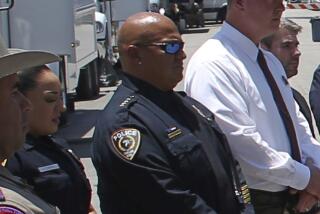Colonel, 8 Others Formally Charged With the Murder of 6 Jesuit Priests : El Salvador: Civilian judge orders all held for trial. Depositions bare grim details of slaughter.
SAN SALVADOR — A civilian judge on Friday formally charged nine members of El Salvador’s army, including a colonel, with premeditated murder in the November slayings of six Jesuit priests.
Judge Ricardo Zamora of the 4th Penal Court ordered the military men to be held for trial. Zamora has up to 120 days to continue investigating the case and legally may reverse his decision during that time.
Col. Guillermo A. Benavides Moreno, director of El Salvador’s Military Academy, and seven other suspects are in military custody. The ninth soldier charged in the case deserted from the armed forces and is a fugitive.
Benavides, who was in command of the zone where the killings occurred on the night they happened, is the highest-ranking officer ever charged with a political killing here. Military and paramilitary death squads have been accused of killing thousands of civilian leftists, students, union leaders and peasants during the country’s 10-year civil war, but most of the murders have gone unsolved.
The priests, their cook and her 15-year-old daughter were killed before dawn Nov. 16 at their residence on the campus of the University of Central America. The slain priests included university rector Ignacio Ellacuria and vice rector Ignacio Martin-Baro; all were leftist intellectuals and advocates of negotiations between the U.S-backed government and guerrillas of the Marxist-led Farabundo Marti National Liberation Front (FMLN).
Many extremists of the right blame the Jesuit educators for fomenting the civil war and believe the priests aided the armed rebels. The murders occurred five days after the FMLN launched a major urban offensive.
The killings provoked an international outcry and threats from the U.S. Congress to cut off the $1.4 million a day that the United States provides in aid to El Salvador.
In vivid pretrial depositions made public with the judge’s decision, several of the soldiers described the priests as “terrorists,” and two lieutenants told of receiving orders from Benavides to kill them.
“Well, men, we are betting it all,” 2nd Lt. Gozalo Guevara Cerritos quoted Benavides as having said. “It’s us or them, and they have been the intellectuals leading the guerrillas for a long time.”
In the words of Lt. Jose Ricardo Espinoza Guerra, Benavides said: “This is a situation where it is them or us. Let’s start with the heads. We have the university in our zone, and Ellacuria is there.”
Guevara and Espinoza both testified that Benavides told them, “I don’t want any witnesses.”
Benavides’ testimony was not made public, but President Alfredo Cristiani has said that the colonel denied ordering the killings. Under Salvadoran law, the testimony of a defendant cannot be used against a co-defendant.
Sources close to the investigation said that other soldiers who provided security the night of the killing have not been charged in the crime so that they may legally testify.
The testimony of the soldiers who were charged provides step-by-step descriptions of how the priests and the two women were murdered. Five of the priests were shot face-down in the grass behind their residence. A sixth priest was shot inside the building, and the two women died in their room.
Sgt. Antonio Ramiro Avalos, Cpl. Angel Perez Vasquez and Pvt. Oscar Amaya admitted that they shot the priests dead. Avalos said they did so after receiving an order from Lt. Espinoza.
Perez Vasquez described entering the residence where the individual priest had been shot and feeling the dying man grab his ankles. The corporal stepped back and fired four more bullets into the priest.
Sgt. Tomas Zarate admitted shooting the housekeeper, Elba Ramos, and her daughter, Celina. Avalos said that as he was leaving the residence after the massacre of the priests, he heard groans coming from the darkness of the women’s room. He lit a match.
“Inside, two women were on the floor hugging and weeping,” Avalos said. He ordered the fugitive private, Jorge Alberto Sierra, to finish them off, and Sierra “fired . . . about 10 shots at the bodies of the women until they stopped crying.”
Lawyers for the military men said that the extrajudicial testimony was not valid. They claimed the declarations had been obtained with psychological torture.
The murder charges imply “premeditation and perfidy” and carry a maximum sentence of 35 years, the lawyers said.
Diplomats and religious leaders lauded the bringing of charges as a step toward ending the military’s traditional immunity in human rights cases, but they said that continued pressure must be applied on the government to follow through with prosecution of the case. Many human rights cases have come to a halt in El Salvador’s antiquated legal system.
The government and U.S. Embassy had been concerned that the formal filing of charges might stir up tensions within the armed forces, but there were no outward signs of anger Friday.
More to Read
Sign up for Essential California
The most important California stories and recommendations in your inbox every morning.
You may occasionally receive promotional content from the Los Angeles Times.










